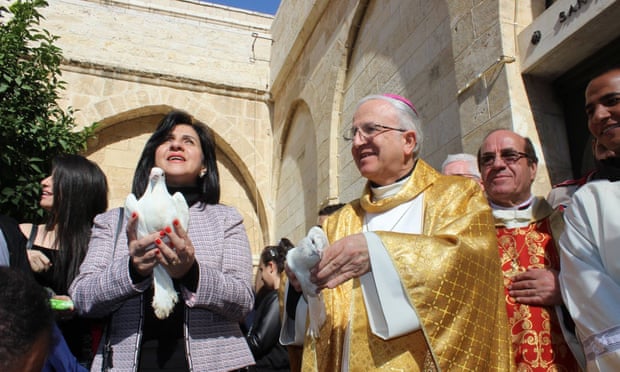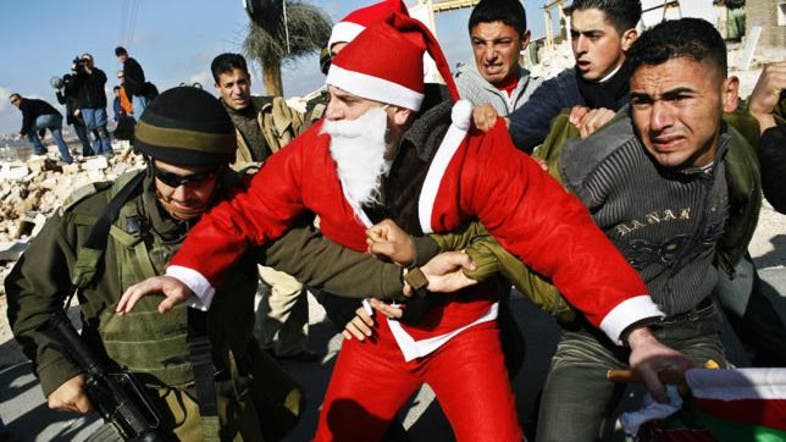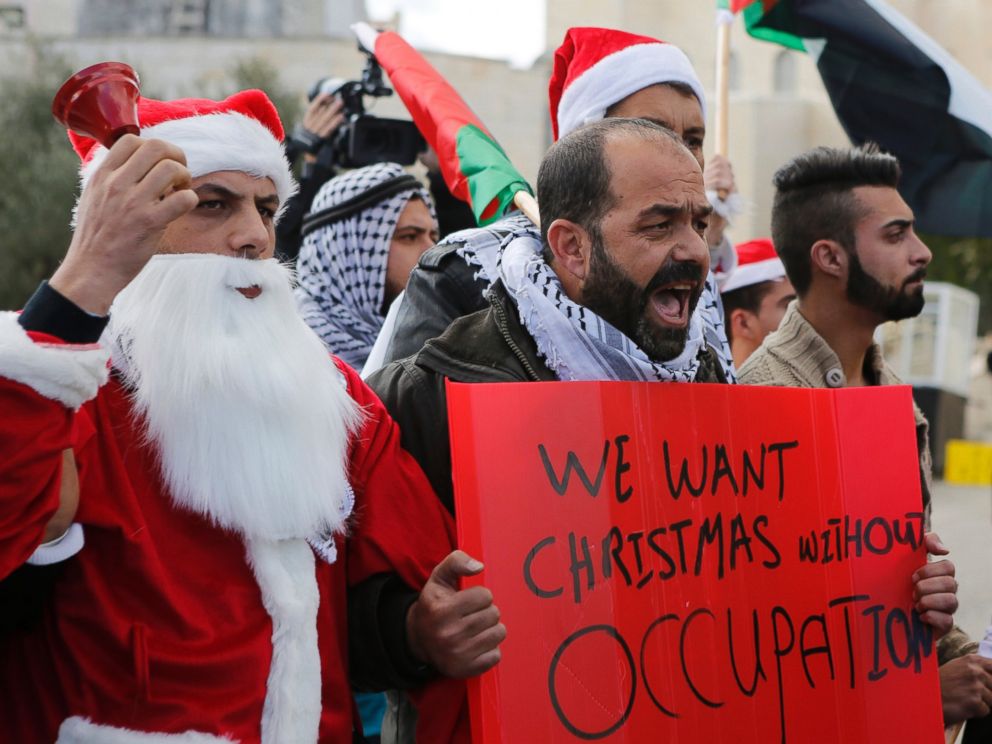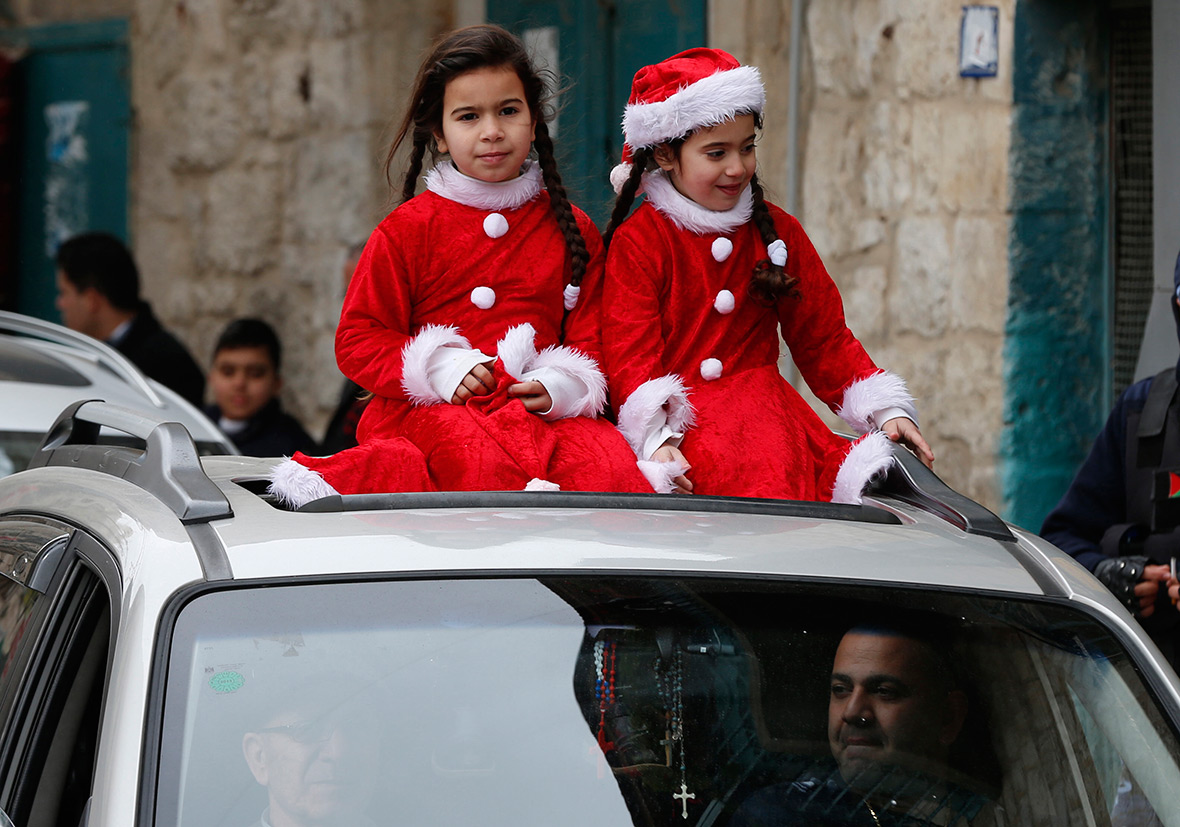O little town of Bethlehem, how unstill
An article on the protest from the International Business Times follows the one from the Guardian.

The tree in Bethlehem was lit on December 5th, 2015
Mayor of Bethlehem: ‘We light our Christmas tree as a message of peace’
Vera Baboun, the first female leader of the Palestinian city believed to be the birthplace of Jesus, says the violence all around cannot extinguish their hope
By Naomi Larrson, The Guardian
December 17, 2015
On 5 December the star at the top of the Christmas tree in Manger Square, Bethlehem was lit, signifying the start of the festive season. The Palestinian city, home to the holy sites of the Church of Nativity believed to be the birthplace of Jesus, is a symbol of peace for those who celebrate Christmas around the world. The symbol is very significant this winter, with relations between Israel and Palestine once again increasingly volatile.
“We had a message to give to the world, and we did,” says Vera Baboun, mayor of Bethlehem. “When we lit the tree, we gave a message that we cannot be without hope. We have to be with hope, despite everything surrounding us: the political situation, the situation in the middle east, and war.
“This political situation cannot take away the joy for the children, nor prevent us from celebrating.”
True peace can never prevail in the world as long as the city of peace does not live in peace
Vera Baboun
Recent violent incidents have tempered this year’s Christmas celebrations in the holy city. Fewer streets were decorated, some festivities were cancelled and there was no fireworks display, which traditionally marks the lighting of the Christmas tree.
Instead, Baboun, a Christian, looked for a different method to mark the festive season. Churches around the world were invited to ring their bells at the same time, as a symbol of peace and solidarity. “Sixty nine churches rang their bells when the Christmas tree of Bethlehem was lit,” says Baboun. “If humanity remains silent, let the bells of Bethlehem speak instead. The bells ring to reflect the mosaic of the city: they reflect the joy, the existence, the danger that we’re living in – everything.”
The day we speak, Baboun has returned from a memorial service for a teenager who was killed by Israeli soldiers in a refugee camp just south of Bethlehem. She is clearly affected, and her voice echoes sadness and frustration. “This is the reality that we live, the challenge that we live,” she says. But there is hope. “We have to keep on the message that we carry.”
Baboun has an enduring love for the city and its inhabitants. She was a lecturer in English literature and language at Bethlehem university for 20 years before becoming the city’s first elected female mayor in 2012. She sees this not only as a personal achievement, but a reflection of a developing society. “It is the way my people, my nation, my citizens think: trusting in a woman, supporting the women,” she says.
As mayor and leader of the governorate of Bethlehem, she is president of the water authority and resident council, among others. It’s a challenge because “you work on the national level and the universal level. The mayor of Bethlehem is responsible for both, and to keep Bethlehem and its message in contact with different parts of the world. And at the same time to lead the process nationally, which includes development, services, looking for resources.”

Vera Baboun: ‘The bells ring to reflect the mosaic of the city: they reflect the joy, the existence, the danger.’ Photo from Bethlehem Municipality
During her time as mayor there have been significant developments. Manger Square has been renovated and the borders of Bethlehem municipality have been increased . There has also been progress in gender equality: according to Baboun, a majority of students at Bethlehem University are women and there’s an equal number of men and women employed by the municipality.

The message of Father Christmas last year in Bethlehem. Photo by Atef Safadi/ EPA
But in some ways progress is limited: 82% of Bethlehem falls inside Area C, which is territory under direct Israeli military and administrative control. “You are leading an authority in a place that you are not fully authorised to lead,” says Baboun. “It cripples your authority, cripples your capacity.”
The economic strains add another level to the importance of Christmas. “Bethlehem depends on tourism,” Baboun says. “During Christmas we have visitors, tours, pilgrims; that’s why the celebration is also important for our economic continuity.” She hopes for cultural understanding between Bethlehemites and the hundreds of thousands of tourists and pilgrims who descend on the city at this time of year. “It’s important to interact with others. What is civilisation about? What is culture about? It is about interaction of people from different nations. What I love in Bethlehem is the very secure ambiance, people are very giving, so you feel it around.”

Banksy mural
As the city continues to celebrate the festive season throughout December – albeit under the shadow of political tensions and violence – Baboun hopes it will act as a symbol of what she believes to be the true meaning of Christmas. In her 2015 Christmas message, she writes: “True peace can never prevail in the world as long as the city of peace does not live in peace. We remain hopeful that the star of Bethlehem will be forever sparkling.”

Santa Claus arrested at Bethlehem checkpoint, December 2014. Photo from Palestinian News Network (PNN).
Bethlehem: ‘Christmas 2015 cancelled’ as violence leaves Aladdin wishing for a miracle
By Nigel Wilson in Bethlehem, IB Times
December 21, 2015
Standing outside his souvenir shop on Star Street gripping a paper coffee cup, Aladdin spotted a group of foreign visitors. “Welcome to Bethlehem!” he called after the Italians. “Welcome to my store! Scarves, olive wood, mother of pearl,” he cajoled, waving a hand towards the colourful kefiyehs hanging overhead.
The tourists looked up and smiled but carried on past the store, headed for the attractions of Manger Square and the Church of the Nativity.
It is a typical interaction in Bethlehem’s Old City but it has become a rarity in recent months here. An ongoing wave of violence in Jerusalem and the West Bank has reduced the flow of foreign visitors to Bethlehem to a drip. What’s more, the slump has hit the city during the usually busy pre-Christmas season.
Bethlehem has traditionally been host to massive church services, markets and festivals during the festive period as Christians from across the world head to the city believed to be the site of Jesus’s birth. The Church of the Nativity is built on the presumed site of the manger where Mary took refuge in Bethlehem and dozens of other churches mark other significant religious sites.

Bethlehem, December 23rd, 2014. Photo by Mussa Qawasma/Reuters
Israel’s massive separation wall that divides the city from Jerusalem and requires tourists to pass a heavy militarised checkpoint has stemmed tourist visits over the past decade, but Bethlehem remains a travel hot spot and the city’s economy is almost exclusively centred on tourism. As numbers have dwindled in recent years, Palestinians have felt the drop off acutely.
“It’s almost Christmas, just a few days from Christmas, and it’s empty,” Aladdin says ruefully, surveying the thin crowd on Star Street. “We never had this situation before. Last year, it was busy here, really busy. A lot of people came to my store. I thought it was going to be like last year.”
Like dozens of other merchants who own stores on the cobbled streets in the Old City, Aladdin offers a range of souvenirs made by local Palestinian producers and sells predominantly to tourists. He has had the space, just off Manger Square, for nine years.
“This year it’s the worst,” he told IBTimes UK. “In my life I’ve never seen this situation. Most of the money coming into Bethlehem is coming from tourists but look around, nobody is coming.”
The slump in visitors began in October, when a wave of political violence spread from Jerusalem to the West Bank and Gaza.
Since then, 19 Israelis have been killed in stabbings, car rammings and shootings, including three soldiers and dozens injured. At least 117 Palestinians have been killed in the same period, with some 69 described as assailants by Israeli authorities. The rest were killed by Israeli forces at demonstrations or during army raids.


Father Christmas knows how to return an unwanted gift. Bethlehem, December 18th, 2015
Bethlehem too has witnessed a number of deadly incidents, albeit far from the tourist hub of the Old City. Vera Baboun, the mayor of Bethlehem, said the instability had significantly affected tourism in the city. “There has been a decrease of 11% in the occupancy at the hotels, compared to last year,” she told IBTimes UK. “This year we are expecting 40% occupancy at the hotels on the 24th, half foreign tourists and half Palestinians.
“When we talk about tourism we’re talking about everybody’s work, it’s not just necessarily the hotel owner. For the hotel to work, we are talking about the people who sell the meat and vegetables, the workers. It’s the same with the restaurants and the souvenir shops. It’s a cycle and everybody is affected.”

Bethlehem, December 18, 2015
The Christmas tree lighting ceremony went ahead as planned and a brigade of scouts have paraded around the town as they do each year. But Maher Canawati, a Bethlehem councillor, said the municipality had decided to tone down the lighting and decoration across the city, while plans for music concerts in Manger Square had also been shelved.
“This year it’s not going to be possible to do something like that. We have a lot of instability and there are a lot of martyrs,” he said. “We are keeping festivals religious this year. We are not going to be doing other kinds of festivals that are not religious.”
The municipality and the businesses are understandably eager to stress that Bethlehem is completely safe for tourists, noting pilgrims and foreigners have not been hurt in the ongoing violence.
Britain’s Foreign and Commonwealth Office travel advice states the situation in the West Bank is tense and travellers should take care, while adding there had been no reports of serious incidents involving foreigners.
At one of the souvenir stores behind the Church of the Nativity, an Austrian tourist named Patrick was picking up a number of olive wood statues for his family.

Peaceful protest march while youths and army clash in Bethlehem, December 18, 2015. Photo by Anne Paq/ ActiveStills
“It’s my second time here this week actually,” he said. “I’m staying in Jerusalem but it’s a special time of the year to visit Bethlehem. I’m a bit surprised there aren’t many tourists here. I wasn’t sure myself before I came but I made an investigation online and it appeared to be safe for tourists, so I came.”
While the mood is festive enough in the centre of town, for many Palestinians living in the rest of the city and nearby refugee camps, the atmosphere is one of tension. Since October, protests against Israel’s occupation have sparked frequent confrontations between Palestinian youths and the Israeli military at the checkpoints here, many of which have turned violent.
On 8 December, 19-year-old Malek Shalin was shot dead by Israeli forces when they raided the Dheisheh refugee camp, close to Bethlehem. The Israeli military said at the time that soldiers had been attacked when they entered the camp. Shalin was the fourth Palestinian from Bethlehem to be killed since October.

“Our Christmas this year is engulfed by the horrific situation on the ground,” said Baboun, the mayor. “Nobody has the right to occupy our joy or our celebration but things on the ground are really tough, really difficult and we’re struggling alone.”
